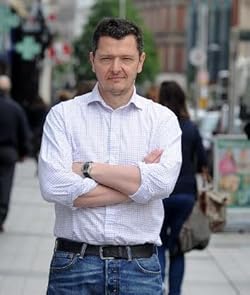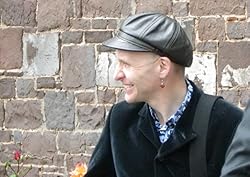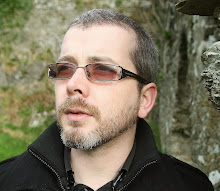Kelly Creighton is a poet and fiction writer with work in literary journals The Stinging Fly, Long Story, Short, Wordlegs, The Galway Review, A New Ulster, The Boyne Berries and numerous other publications.
She was awarded second place in the Abroad Writers’ Conference Short Story Competition judged by Robert Olen Butler, long-listed for The RTE Guide/Penguin Ireland short story contest and shortlisted for the Carousel Writers.
Kelly: I set out to write a thriller, even although nothing else I'd written up to that point was crime, and I wasn't really sure how The Bones of It would eventually be marketed. It is the direction I went because that's what the story called for. That said, I'm very happy to have wound up in the crime world.
Gerard: I'm happy too, especially since your contribution to the Northern Irish crime fiction scene has doubled the number of women writers in our wee community (shout-out to Claire McGowan). I have heard that Lucy Caldwell is writing a crime fiction novel too, which is more great news. Any theories on why it's taken this long for our female talent to shine in the crime world?
Kelly: Doubled! That's a depressing statistic! Lately I've been reading all these articles about how 'so many women read crime', and how 'female crime writers write gorier stuff than men', and 'why today's most exciting crime writers are women', and yet here in NI, where there's a recent explosion in emerging crime writers, there aren't many women writing in the genre.
I don't know why this is. I suppose we don't know what people are getting up to on their pcs until the work is out there for us to read. In The Bones of It, the narrator is a young man, so I'm making sure the next book is from a woman's point of view.
I hope some local women writers get in touch and let me know that they write crime too.
Gerard: I'm glad you mentioned your narrator. I thought you nailed the masculine voice. Quite an accomplishment given Scott's less than conventional personality. Did you have any difficulty writing from his perspective or did it come naturally?
Kelly: Thanks very much, Gerard! It was only after I'd started on the book that I heard a couple of people say, 'How can a woman write from a man's perspective?' and vice versa. The thought that it was strange hadn't occurred to me before that. I still don't know if it is. My stories are probably half and half. I love writing from different perspectives, different ages. That's a big part of what interests me - finding the voice. I think we all start in our own voice, writing semi-autobiographical stuff. As I go on I want to explore characters that aren't familiar to me. There has to be an emotional truth in there that I feel I understand. It doesn't have to be my truth, if you know what I mean. I knew Scott really well before I even started writing, that gave me the confidence to slip into his mindset. The book was written and redrafted in quick bursts, so that made it easier.
Gerard: Was the transition from poetry to prose difficult for you?
Kelly: It's more a back-and-forth between the two than a transition really. I write the odd poem but prose is more my thing. It's so hard to write a poem I'm ever really happy with. I'm in awe of 'proper' poets. Prose has much more freedom and it suits me better.
Gerard: So, what's the craic with the next book?
Kelly: I'm working on two books right now - one is a collection of linked short fiction and the other is a detective novel from the POV of a female detective. This summer is all about finishing the story collection because the house is full of noise and there isn't the headspace to give the novel the attention it needs. I should be wrapping up the novel by the end of the year, then I have the structure in place for the next one. If someone could just arrange more hours in the day, I'd be sorted.
You can follow Kelly on Twitter or send her a friend request on Facebook if you're feeling lucky. And you should get yourself a copy of The Bones of It. CSNI approved.






